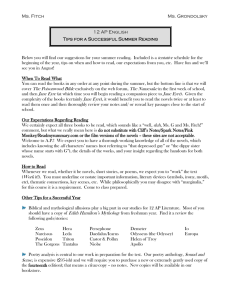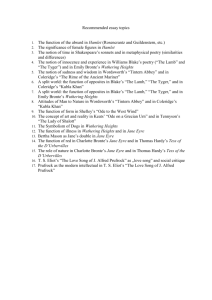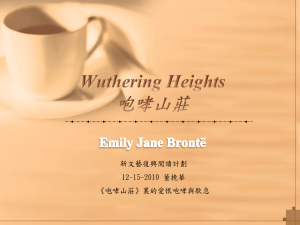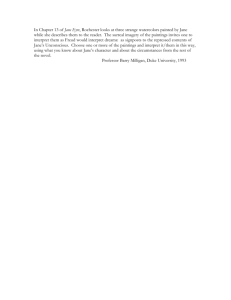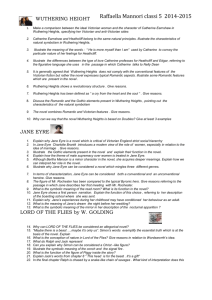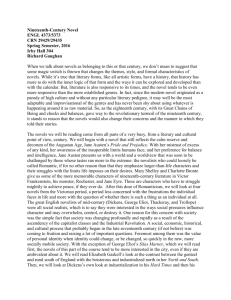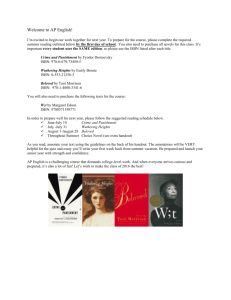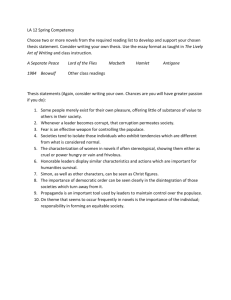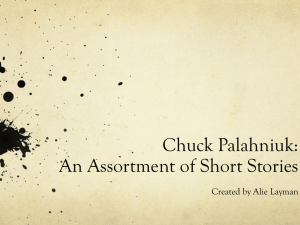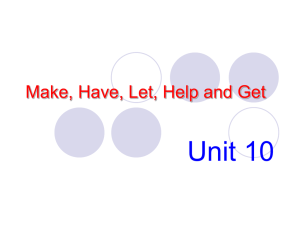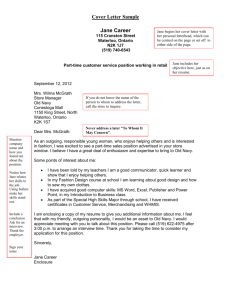Fiction syllabus 2014
advertisement
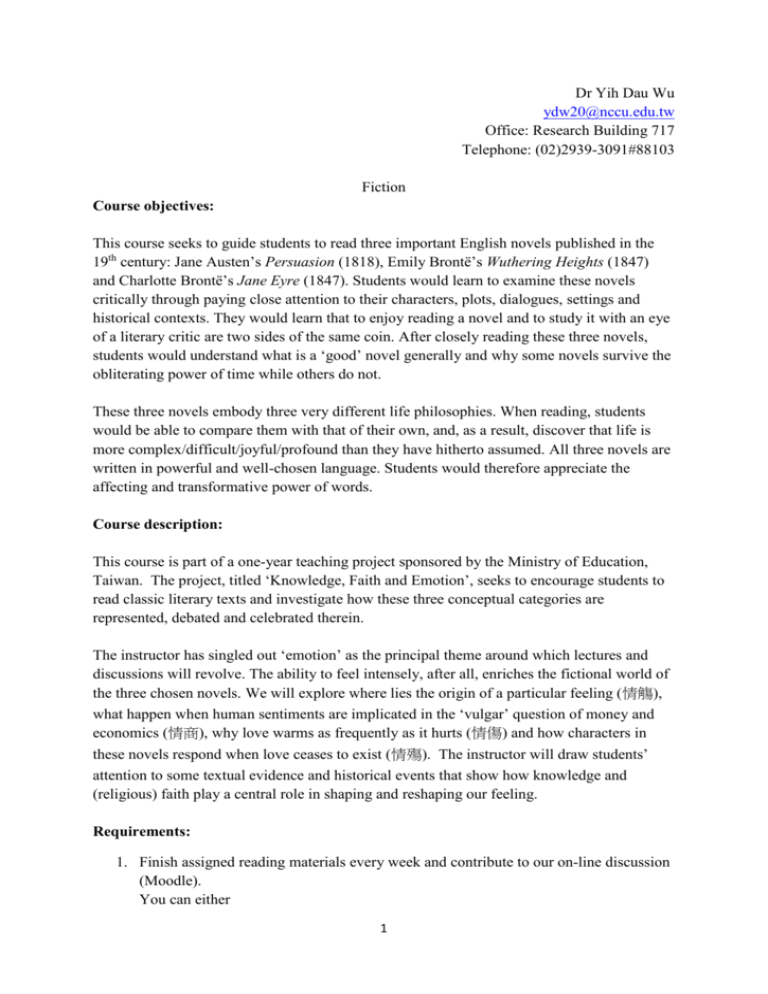
Dr Yih Dau Wu ydw20@nccu.edu.tw Office: Research Building 717 Telephone: (02)2939-3091#88103 Fiction Course objectives: This course seeks to guide students to read three important English novels published in the 19th century: Jane Austen’s Persuasion (1818), Emily Brontё’s Wuthering Heights (1847) and Charlotte Brontё’s Jane Eyre (1847). Students would learn to examine these novels critically through paying close attention to their characters, plots, dialogues, settings and historical contexts. They would learn that to enjoy reading a novel and to study it with an eye of a literary critic are two sides of the same coin. After closely reading these three novels, students would understand what is a ‘good’ novel generally and why some novels survive the obliterating power of time while others do not. These three novels embody three very different life philosophies. When reading, students would be able to compare them with that of their own, and, as a result, discover that life is more complex/difficult/joyful/profound than they have hitherto assumed. All three novels are written in powerful and well-chosen language. Students would therefore appreciate the affecting and transformative power of words. Course description: This course is part of a one-year teaching project sponsored by the Ministry of Education, Taiwan. The project, titled ‘Knowledge, Faith and Emotion’, seeks to encourage students to read classic literary texts and investigate how these three conceptual categories are represented, debated and celebrated therein. The instructor has singled out ‘emotion’ as the principal theme around which lectures and discussions will revolve. The ability to feel intensely, after all, enriches the fictional world of the three chosen novels. We will explore where lies the origin of a particular feeling (情觴), what happen when human sentiments are implicated in the ‘vulgar’ question of money and economics (情商), why love warms as frequently as it hurts (情傷) and how characters in these novels respond when love ceases to exist (情殤). The instructor will draw students’ attention to some textual evidence and historical events that show how knowledge and (religious) faith play a central role in shaping and reshaping our feeling. Requirements: 1. Finish assigned reading materials every week and contribute to our on-line discussion (Moodle). You can either 1 2. 3. 4. 5. (a.) identify at least one passage that strikes you as most interesting/confusing/touching, and post comments/questions/ related issues. OR (b.) respond to others’ comment and engage in an intellectual dialogue. A simple ‘I agree with you’ is not acceptable. Your response can be searching but must be courteous. Each student need to have at least 10 posts on Moodle. You need finish posting your ideas on-line before 8 pm, every Thursday. Late posts will be ignored. Group discussion will be a regular feature in our class. You are required to express your opinion and respond to that of others. Frequent refusal to get involved is punishable by a humiliatingly low grade. Freedom of speech is highly valued. Students who show disrespect to other speakers (implicitly or explicitly) will be asked to leave the classroom immediately and never to return again. Lectures and discussions will be conducted in English. As we do not have mid-term and final exams, weekly participation is essential. Students whose absences exceed 6 hours without good reasons will not pass this course. Grading policies: Weekly contributions (including regular attendance, class participation and on-line discussion) 60% Final project 40% (choose one of the following tasks) 1. Write a research paper (1500 words) in an academic style that demonstrates your original interpretation of the chosen text(s). 2. Write an essay (1500 words) that shows how your novel-reading experience affects your life. (e.g. ‘An Emily Brontё Education’) 3. Adapt (an) episode(s) from one of the three novels, place it (them) in a 21st-century setting, make a 20-minute video and post it onto Youtube. This option requires teamwork. There should be no more than 8 people in one group. After the film is completed, you need to give me a list explaining how works are distributed. 4. Re-write episode(s) in the three novels and create a short story (1500 words). 5. Respond to three essay questions and write three exam essays (500 words each). In theory, task 1 and 3 require more time and effort. Students who undertake either of them and do a good job can win an extra 10 points for their final grade. 2 Bad attitude (disruptive or apathetic behaviour) will incur disastrous consequences, no matter how well you do in your Moodle discussion and final project. Examples of disruptive /apathetic behaviour: (1) Loud chatting when other people are expressing their ideas in class (2) Treating other people’s comments with disrespect (3) Refuse to participate in discussion. (4) Finish in-class discussion in a cursory, lazy, irresponsible fashion. (5) Any action that make your classmates uncomfortable or that violate their right to work in a friendly and supportive environment. SOP (Standard Operating Procedure) for disruptive or apathetic behaviour 1st and 2nd offence => you will receive a warning from the instructor 3rd offence => you will be asked to leave the classroom for a short while until you find yourself ready to behave. Your final grade will stay below 70. th 4 offence => you will be asked to leave the classroom again and be advised to drop this course. Your final grade will stay below 60. th 5 offence => you will receive a ‘0’ for your final grade. Schedule: Week 1 (19th Sep) Week 2 (26th Sep) Week 3 (3rd Oct) Introduction Persuasion pp. 3-47; V. 1 ch. 1-6 (including ‘the biographical notice of the author’) Persuasion pp. 47-98; V. 1 ch. 7-12 Week 4 (10th Oct) National Holiday Week 5 (17th Oct) Persuasion pp. 99-154; V. 2 ch. 1-8 Week 6 (24th Oct) Persuasion pp. 154-202; V. 2 ch. 9-12 Week 7 ( 31st Oct) Week 8 (7th Nov) Week 9 (14th Nov) Wuthering Heights pp. 3-49; ch. 1-7 Wuthering Heights pp. 50-104; ch. 8-12 Wuthering Heights pp. 104-54 ; ch. 13-18 Week 10 (21nd Nov) Week 11(28th Nov) Week 12(5th Dec) Wuthering Heights pp. 154-202 ; ch. 19-26 Wuthering Heights pp. 202-58; ch. 27-34 Jane Eyre pp. 5-70; ch. 1-9 Week 13(12th Dec) Jane Eyre pp. 70-154; ch. 10-17 3 Week 14 (19th Dec) Jane Eyre pp. 154- 234; ch. 18-24 Week 15 (26th Dec) Jane Eyre pp. 234-305; ch. 25-30 Week 16 (2nd Jan) Jane Eyre pp. 305-85; ch. 31-38 Week 17 (9th Jan) Final project due Textbooks: Austen, Jane. Persuasion. Ed. James Kingsley. Oxford: Oxford UP, 2004. Brontё, Emily. Wuthering Heights. Ed. Richard J. Dunn. New York: Norton, 2003. Brontё, Charlotte. Jane Eyre. Ed. Richard J. Dunn. New York: Norton, 2001. 4
